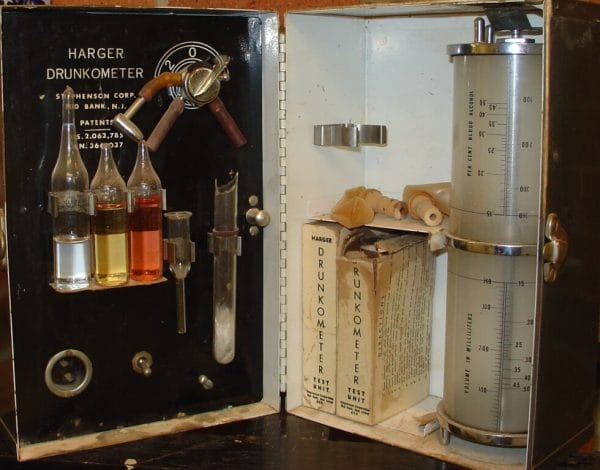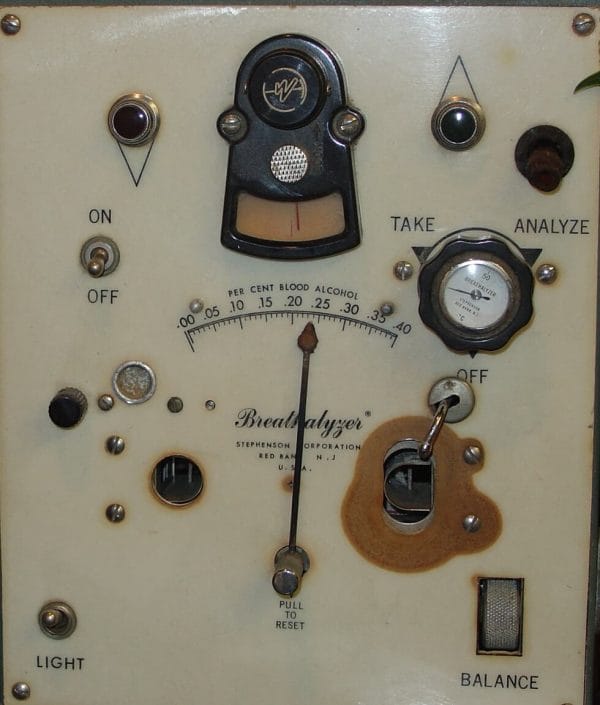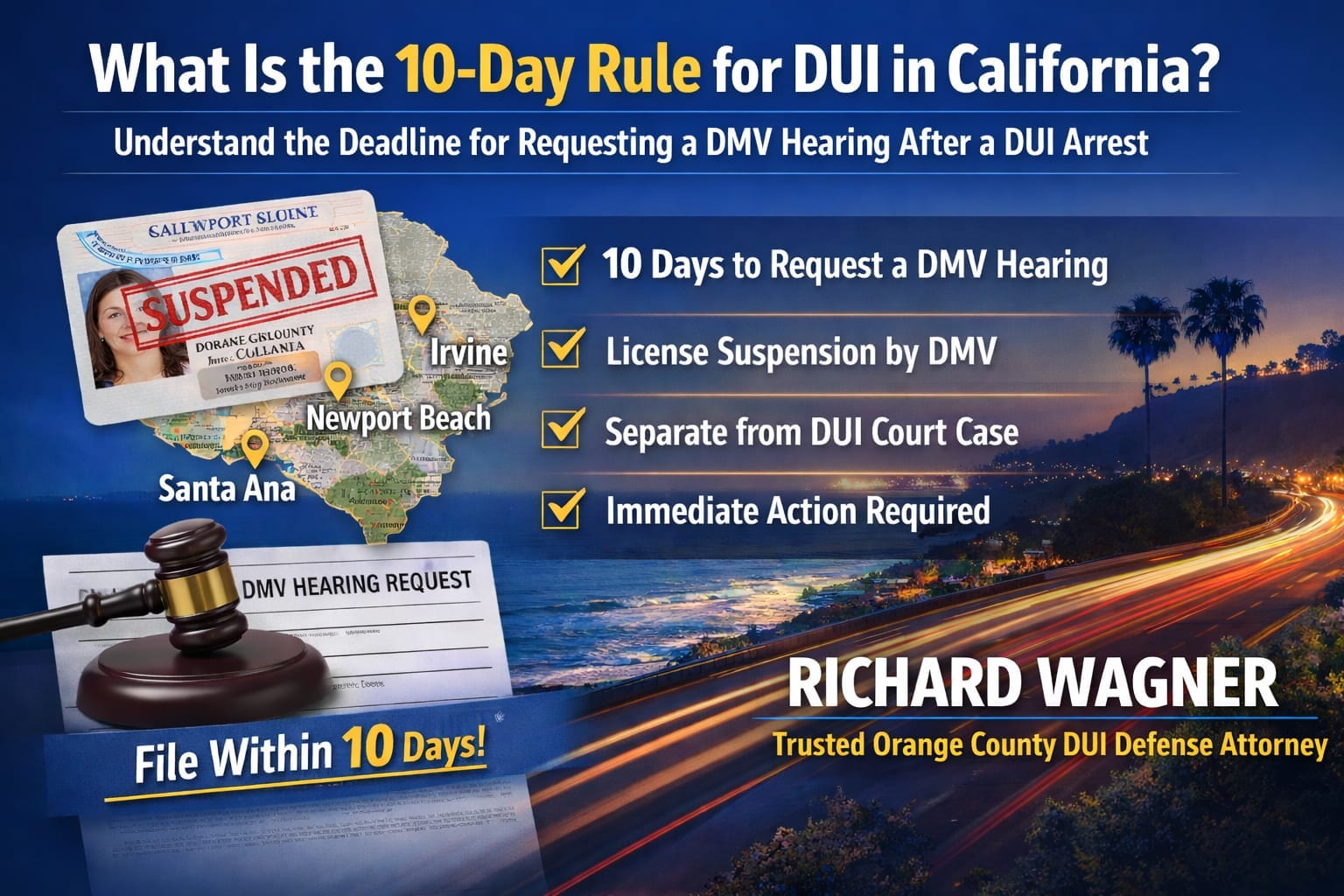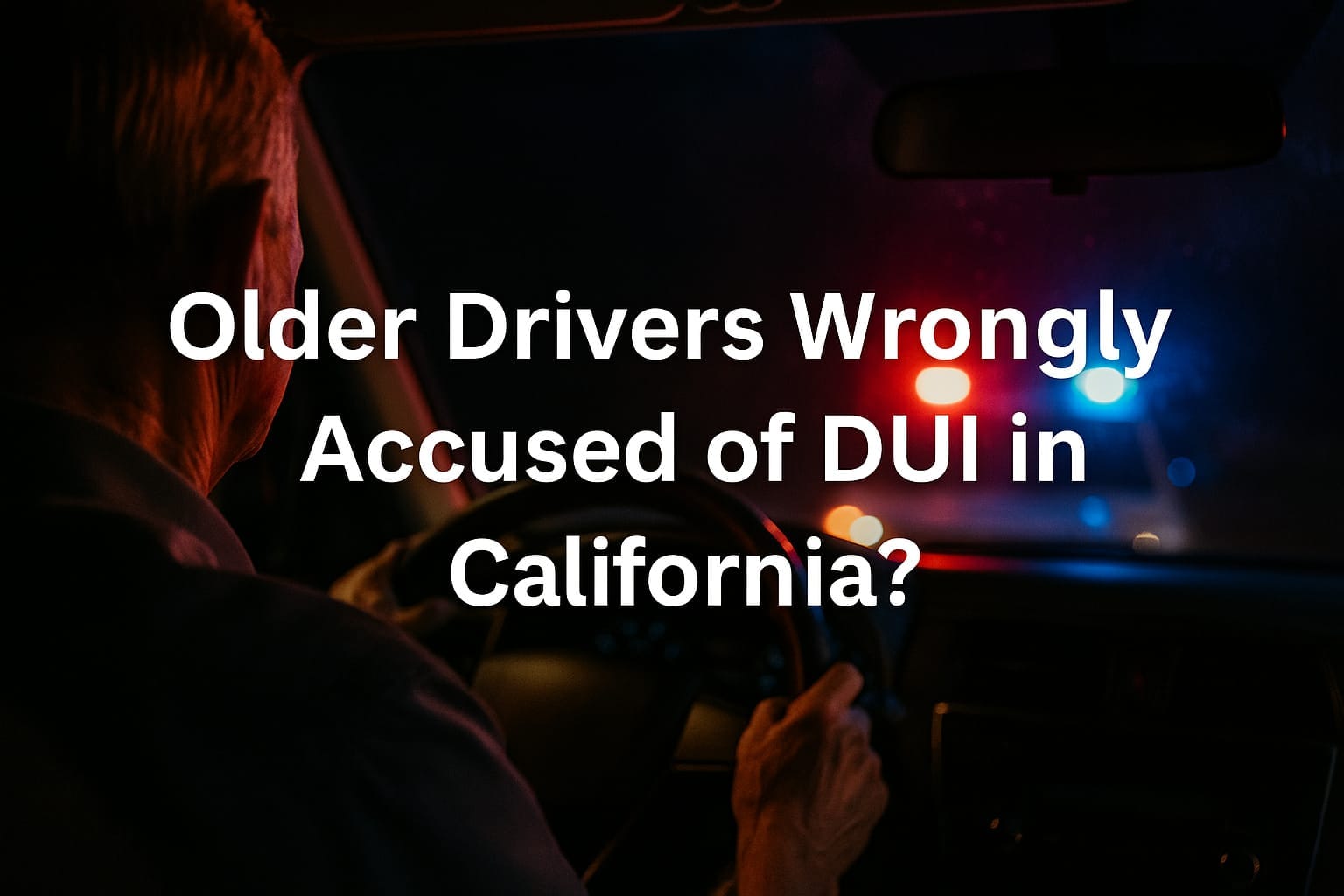DUI Breath Tests In California
When you have been pulled over and are suspected of drunk driving, you could be asked to blow into a drunk driving breath test. Misconceptions exist about what your rights are and what these tests are.
Misunderstandings can lead to more problems, especially if you are facing DUI charges in California.
Richard Wagner is a DUI defense lawyer in California. He helps his clients understand all aspects of their drunk driving case.
Irvine DUI Lawyer Richard Wagner believes informed clients make better decisions about their DUI case. If you have questions or want to discuss your DUI in California, call (714) 721-4423 to schedule a FREE consultation.
What Are Breathalyzers?
Police officers use breath test devices, commonly called as “breathalyzers,” in roadside testing and following arrests to help determine whether an alleged drunk driver was under the influence of alcohol and driving with a certain BAC while operating a vehicle.
In California, “Breath Alcohol Testing” means the analysis of a person’s expired breath, using a breath testing instrument to obtain a breath alcohol result.1
There are over 150 models of breathalyzers created by over 25 different firms that have been approved by the National Highway Traffic Safety Administration (NHTSA) for DUI breath testing.
One of the first breath-testing machines was the Drunkometer®

Electrochemical (fuel cell) and infrared spectrophotometry are the two technologies used today to measure alcohol in breath samples. (There are many different types of alcohols. The alcohol of concern is ethyl alcohol, aka ethanol, which has a chemical formula of C2H5OH.)
These tests can be used for drivers of cars and trucks as well as motorcycles, boats, and other vehicles as defined by their respective states.
There are two different times when the police try to get you to blow into a breathalyzer:
- the preliminary alcohol screening test (PAS) before you are arrested, and
- the evidential breathalyzer, after you are arrested.
Confusion arises because both “categories” are frequently referred to as “breath tests.”
Preliminary Alcohol Screening (PAS) Tests
A preliminary alcohol screening test, or PAS test, is a breathalyzer test conducted using a handheld portable breath machine on the side of the road during a traffic stop or DUI investigation. Unlike other states or jurisdictions, PAS test results are admissible in Southern California courts.
PAS tests are optional if you are 21 or older, and the law says the officer must advise you of your right to refuse the PAS test.2 If you are under 21, then you have to take the PAS test. If you refuse the PAS, you could suffer serious consequences.3
Police give PAS tests when they believe you have been driving under the influence of alcohol. The police usually try to get you to blow into the PAS machine after field sobriety testing.
Maybe your speech was slurred or your eyes were red and watery. If you “fail” the PAS test, that could be probable cause to arrest you for a drunk driving offense.
A PAS result can also be used together with poor performance on field sobriety tests as probable cause to arrest you.
Breathalyzers
After an arrest for a drunk driving offense, you will have to take a blood or breath test. Typically, these are referred to as chemical tests.

One of the first Breathalyzer® machines.
The breathalyzer used by the police in Orange County both before and after an arrest are the same – Alco-Sensor VXL by Intoximeters, Inc.
The Alco-Sensor VXL uses fuel cell technology. It is a small, lightweight, battery-operated handheld device.
(Side Note: Intoximeters, Inc. has manufactured over 30 different breathalyzers, including the Alco-Sensor III, Alco-Sensor IV, Alco-Sensor IV XL, and Alco-Sensor V).
In Los Angeles, the breathalyzer police use after you are arrested is not a portable machine. It is located at the jail or police station. In LA, they typically use the Datamaster DMT or EC/IR II.
All breathalyzer machines are subject to calibration requirements established by Title 17 of the California Code of Regulations.
15-Minute Observation Period
Before you blow into a breathalyzer, the officer is required to have you “under continuous observation for fifteen minutes” before providing a breath sample.4
The purpose of this observation period is to make sure you did not put anything in your mouth, or you did not regurgitate, burp, vomit or drink anything. If any of these were to happen, the breath sample could be contaminated, and the results would not be reliable.
Do I Have a Right to Refuse a Breath Test in California?
Whether you are in Orange County, Los Angeles, or anywhere in California, you can refuse a breath test in either situation. Preliminary Alcohol Screening tests are voluntary if you are 21 and over. After you have been arrested, blood tests and breathalyzers are no longer voluntary. You can, however, still refuse either one.
Keep in mind, though, that you should be ready for drastic consequences stemming from the refusal. Consequences include DMV license suspensions or revocations. Read About What Happens When You Refuse A Blood or Breath Test After A DUI
All states have their own variations of implied consent laws.5 These laws basically say that you implicitly agree to obey the rules of the road when you get a driver’s license.
As such, you also implicitly agree to any chemical tests (breath, blood, or urine tests) in exchange for the privilege of operating a vehicle in the state.
If you refuse, the state’s DMV can impose an automatic license suspension and fines against you. You do not have to be charged and convicted of a drunk driving offense to have your license suspended or revoked. However, you are entitled to a DMV hearing to challenge the legality of the suspension.
What’s more, in some courts, your refusal may be used against you in court as evidence that you knew you were guilty – they refer to it as “consciousness of guilt.” If you are convicted, your sentence might include jail time.
Further, if you refuse, the officer will most likely get a search warrant to get your blood sample. Blood tests, if done properly, can be more reliable and accurate because breath tests are an indirect measurement of your blood-alcohol concentration (BAC).
If you were arrested in Southern California, you should speak to a drunk driving defense lawyer who handles both DMV and criminal DUI cases. For DMV cases, you have the right to a hearing to challenge the automatic license suspension if, for example, the police failed to warn you of the consequences.
The officer must explain the consequences in detail so that you can understand them.6 Criminally, you can fight DUI-related charges and be successful.
WHAT IS BREATH?
A breath sample means a portion of expired breath which is essentially alveolar7 air in composition obtained for the purpose of measuring its alcohol concentration.8
Since ancient times, breath has had a spiritual dimension. It is an excellent meditation object precisely because it is not an object, has not shape or form.9
“the Lord God formed man from the dust of the earth. He blew into his nostrils the breath of life, and man became a living being.”10
The German word for breathing – atmen is derived from the ancient Indian (Sanskrit) word Atman, meaning the indwelling divine spirit or God within.11
Common Problems with Breathalyzers in California
Breath tests can be unreliable in certain situations or circumstances.
Problems with breathalyzers can be categorized as those resulting from the testing device or machine, the individual operating the device, or the test sample.
Problems with the Breathalyzer Device
- Improper calibration
- Broken or otherwise not maintained properly
- Not specific for Alcohol
- Margin of Error – Measurement Uncertainty
- RFI /Electromagnetic Interference
Issues with the Administration of the Test
- Failure to follow Title 17 of the California Code of Regulations
- Improper instructions
- Failure to follow testing manual
- Testing performed by an untrained person
Causes of Improper Breathalyzer Test Readings
- Pre-existing conditions or other medical conditions suffered by the test taker
- Medications, foods, or drinks
- Mouth alcohol / regurgitation
- Certain diets, like Keto
- False High Readings During the Absorptive State
Breath tests can be challenged. A criminal defense lawyer can file motions to suppress or exclude the results. Sometimes, if successful, this could result in dismissal of the charges or an acquittal. Review Some Examples of Richard Wagner’s Successful DUI Case Results
Five Ways To Beat DUI Breath Tests in California
A breath test is often a substantial part of the prosecution’s case involving DUI offenses. For that reason, it is essential to ensure that a breath test is given correctly and the results are accurate.
DUI defense attorneys who have been well trained and have experience in these cases can identify a problem with a breath test and take proper action to suppress it as evidence.
DUI Attorney Richard Wagner can take any of the following actions, depending on the specific facts and circumstances of your case:
- Attack the reliability of the breath test. Many reasons exist why we may not be able to rely on the results of a breath test, like a faulty machine, improper administration, or health issues with the test taker.
- Prove the breath device was not properly calibrated. Each state has its own laws on calibration, but there is a difference between calibration check records and records showing a calibration of the breath machine. The first is to check to see if the machine is properly measuring samples. The latter is an actual adjustment or calibration of the machine.
- Prove the device was not properly maintained. Typically, the date and time of repairs and maintenance, as well as the nature and extent of and who performed the maintenance and repairs, must be logged. There is a difference between routine maintenance and repairs.
- Prove there was a lack of training or an operator’s error. Police must be trained in order to conduct breath tests. An untrained or uncertified police officer may not properly administer the test. In some cases, the police officer is trained to use one breath machine, but not the one that was used for you.
- Prove records were not properly maintained. Records should be kept to show proper calibration and maintenance, and failure to keep those records updated can be used to prove the device was not properly calibrated or maintained as the law requires.
During the discovery phase of your criminal case, DUI Attorney Richard Wagner will obtain the information and evidence needed to support arguments against the breath test’s admissibility and reliability.
Contact a DUI Defense Lawyer in Irvine Today
You can have your day in court to challenge DUI charges regardless of whether you took and “failed” a breath test or refused one. With the right DUI defense lawyer in California, you can be successful.
Contact The Law Office of Richard Wagner today by calling us at (714) 721-4423 or filling out an online form to schedule a FREE consultation. We will review your case and discuss your best legal options.
- Orange County DUI Attorney
- DUI Defense Attorney
- DUI Checkpoints
- First DUI, Second DUI, Third DUI, Under 21 DUI
- What is BAC?
- Breath Tests During the Absorptive Phase: Not Reliable
LEGAL AUTHORITIES
1 17 California Code of Regulations 1215(c).
2 California Vehicle Code Section 23612(i): “The officer shall advise the person … of the person’s right to refuse to take the preliminary alcohol screening test.”
3 California Vehicle Code Section 13388. Preliminary alcohol screening test of person under 21 who is driving and officer has reasonable cause to believe that person is in violation of Section 23136.
4 17 CCR 1221.1(b)(1): “The breath sample shall be collected only after fifteen continuous minutes during which time the subject must not have ingested alcoholic beverages or other fluids, regurgitated, vomited, eaten, or smoked.”
5 California Vehicle Code Section 23612(a)(1)(A): “A person who drives a motor vehicle is deemed to have given his or her consent to chemical testing of his or her blood or breath for the purpose of determining the alcoholic content of his or her blood, if lawfully arrested for an offense allegedly committed in violation of Section 23140, 23152, or 23153.”
6 Thompson v DMV (1980) 107 Cal.App.3d 354; Giomi v DMV (1971) 15 Cal.App. 3d 905, 906, Decker v. DMV (1972) 6 Cal. 3d 903.
7 17 CCR 1215(b): “Alveolar” refers to the smallest air sacs in the lungs and to that portion of the expired breath which is in equilibrium with respect to alcohol with the immediately adjacent pulmonary blood.”
8. 17 CCR 1215(r).
9 Tolle, Eckhart, A New Earth, Awakening to Your Life’s Purpose (2005), p. 246.
10 Genesis 2:7
11. Tolle, Eckhart, A New Earth, Awakening to Your Life’s Purpose (2005), p. 245.


